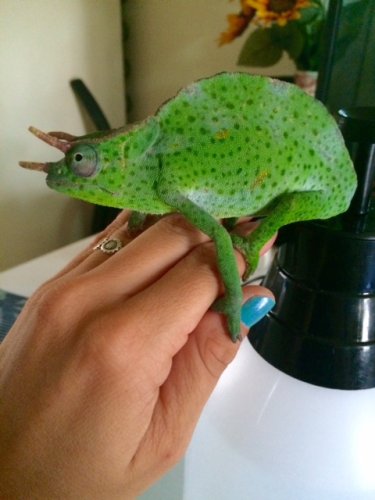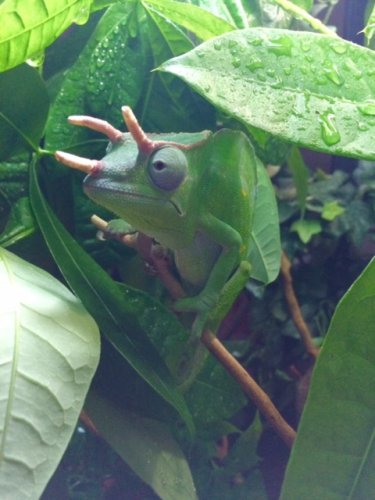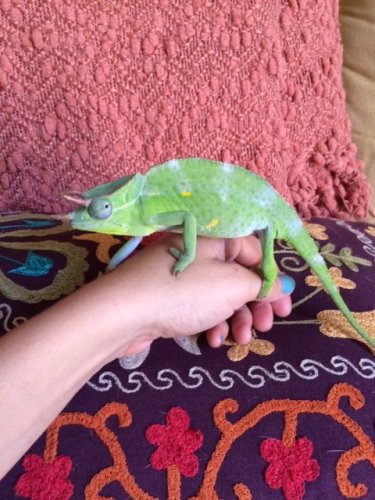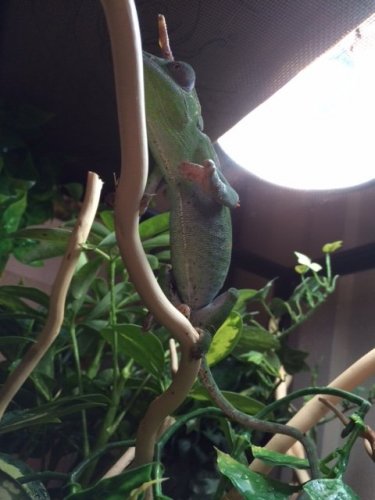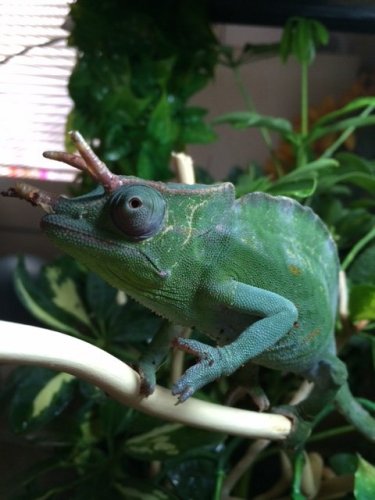AxelsMum
Member
Hi
I am a new mum to a three horned deremensis chameleon named Axel. He was given to me by a friend who quickly had buyers remorse due to the challenging care Axel must be given. Unfortunately I do not know how old he is?
I have recently done ample amounts of research on the different species of Chameleons, and have noticed the information varies widely. I have only had him for about a week, and have seen some healthy as well as odd behavior. I would like to give Axel an excellent home and provide knowledgable care as soon as possible. I work very close to my home, so I able care for him whenever needed.
He seems to be eating about 4 medium crickets daily (dusted with calcium with VITD.3), I free range feed him. He is not interest in waxworms or mealworms at the moment, I am hoping this is because he is still getting acclimated to my house. He also doesn’t like to eat from or in front of me, which I know will take time. I would say he is pretty active around 4-7pm everyday. He is currently in a 17x17x20 enclosure, but I am working on getting him a new enclosure almost double the size by next week. In his cage I have 2 Schefflera plants, lots of added manzanita branches, and a little bit of coco for the time being. I can upload more photos of his new enclosure next week once I get everything set up.
I was wondering if I could start off by showing some recent photos of him just to make sure he is looking perfectly healthy and hydrated. I do spray his screened cage lightly about three times throughout the day (I wait in-between sprays for everything to look slightly dried to prevent molding or overwatering his habitat.) I leave his drip on usually 7am-7pm, as well as his basking lights (dome and UV 120V-100W).
I am new to the chameleon lifestyle, but readily available to provide anything necessary for Axel. These photos were taken 2 days ago, and the darker photos are from yesterday. I believe he has just started his shedding process today so I am going to bother him for photos until he’s done.
A few things that seem to be a little abnormal to me:
He seems to be playing in the dirt a little too much.
The top of his lower horn looks as if he broke the tip off. (it looks like dirt but its not)
I am assuming the shedding process has begun by the looks of his underbelly.
thanks so much for your time
please help
Amber
I am a new mum to a three horned deremensis chameleon named Axel. He was given to me by a friend who quickly had buyers remorse due to the challenging care Axel must be given. Unfortunately I do not know how old he is?
I have recently done ample amounts of research on the different species of Chameleons, and have noticed the information varies widely. I have only had him for about a week, and have seen some healthy as well as odd behavior. I would like to give Axel an excellent home and provide knowledgable care as soon as possible. I work very close to my home, so I able care for him whenever needed.
He seems to be eating about 4 medium crickets daily (dusted with calcium with VITD.3), I free range feed him. He is not interest in waxworms or mealworms at the moment, I am hoping this is because he is still getting acclimated to my house. He also doesn’t like to eat from or in front of me, which I know will take time. I would say he is pretty active around 4-7pm everyday. He is currently in a 17x17x20 enclosure, but I am working on getting him a new enclosure almost double the size by next week. In his cage I have 2 Schefflera plants, lots of added manzanita branches, and a little bit of coco for the time being. I can upload more photos of his new enclosure next week once I get everything set up.
I was wondering if I could start off by showing some recent photos of him just to make sure he is looking perfectly healthy and hydrated. I do spray his screened cage lightly about three times throughout the day (I wait in-between sprays for everything to look slightly dried to prevent molding or overwatering his habitat.) I leave his drip on usually 7am-7pm, as well as his basking lights (dome and UV 120V-100W).
I am new to the chameleon lifestyle, but readily available to provide anything necessary for Axel. These photos were taken 2 days ago, and the darker photos are from yesterday. I believe he has just started his shedding process today so I am going to bother him for photos until he’s done.
A few things that seem to be a little abnormal to me:
He seems to be playing in the dirt a little too much.
The top of his lower horn looks as if he broke the tip off. (it looks like dirt but its not)
I am assuming the shedding process has begun by the looks of his underbelly.
thanks so much for your time
please help
Amber

